While forward Travis Konecny is not set to become an unrestricted free agent until after the 2024-25 season, it’s not too early for the Philadelphia Flyers to think about extending his deal. The soon-to-be 27-year-old has followed up his 31-goal and 30-assist campaign last season (in 60 contests) with 23 goals and 20 assists in 51 games in 2023-24, putting him on pace to lead the Flyers in points for the fourth time in the last five seasons.
With his team in a playoff spot despite being in a rebuild, would it make sense for management to give him a big extension? Based on market value for a player of his caliber — with the cap slated to rise to $87.7 million next season — he could be due for a raise to $9 million annually (depending on if he’s willing to take a discount for, likely, the maximum term of eight seasons if he’s not selling himself short). What are some of the pros and cons of a deal like this?
Pro: Konecny Might Not Return a Haul
The Flyers giving up a player like Konecny — especially since he’s due for a big raise — won’t bring a return equal to what they’d give up. Likely, they’d be looking at a couple of late first-round picks and maybe a decent prospect along with that. He’s a star player, but not one that can carry a team, so that more or less makes sense.
Instead of looking at the draft picks as just that, we need to look at the players they turn into. Among the couple hundred still-active players who were selected in late in the first round, very few of them are better than Konecny. Only Brock Boeser and David Pastrnak were drafted in the latter third of the first round and have more points this season, which is a very low hit rate.

So, unless the Flyers pull off a miracle and use the draft picks they’d receive in a deal for Konecny well, they wouldn’t be getting anything better or equal to him. Drafting a future middle-six forward in that range is usually considered a successful pick. Getting a roster staple who can play in the top nine of the forward group would be a solid use of that selection.
This argument flips if Konecny is dealt for a high-end draft pick. But how many teams are willing to do that? The Minnesota Wild, Buffalo Sabres, and Arizona Coyotes all have fairly decent rosters and good farm systems that might just need that immediate star player to help them take the next step. But that can’t be the expectation.
Unless general manager (GM) Daniel Briere can pull off a masterful deal, the team receiving Konecny is more likely to win any trade. Settling for late first-round picks isn’t ideal, but the Flyers would probably have to based on a similar situation in that of the Timo Meier trade last season between the San Jose Sharks and New Jersey Devils.
Con: Konecny’s Prime Years Could Be Wasted
While it’s important to recognize the odds would be stacked against the Flyers in getting someone back as good as Konecny, it’s also true that his best years would be during the first few of the extension, not the end of it. He could always be like Joe Pavelski, Brad Marchand, or Claude Giroux and be a valuable piece into his late 30s, but the Flyers absolutely cannot bet on that happening.
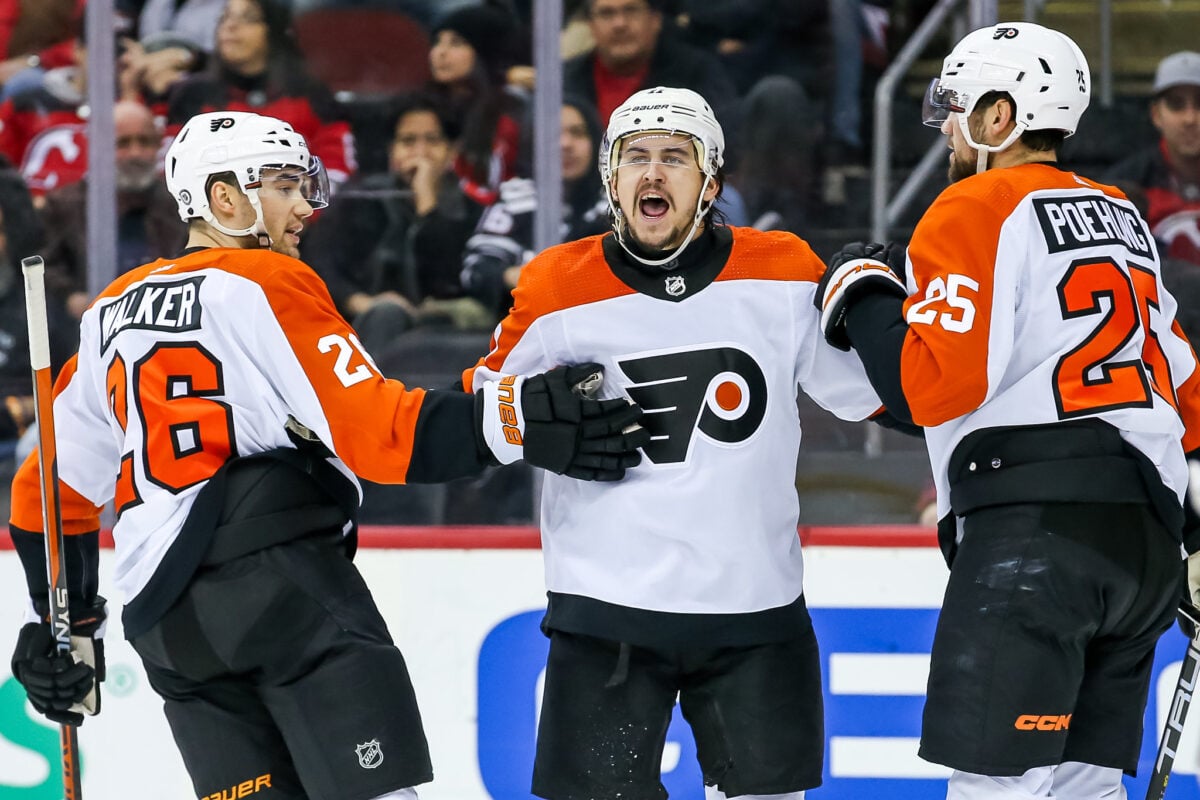
It’s not exactly a wise idea for Konecny’s peak years on Flyers’ teams that probably won’t compete for a Stanley Cup. Ideally, you’d want him to be at his best when the team has a contending roster. Superstar prospect Matvei Michkov is not set to come over to the Flyers until the 2026-27 NHL season, and by that point, Konecny would already be 29 and closing in on his 30. He might be out of his prime altogether by then.
So, instead of the Flyers getting what they can for him in a trade now, an extension would mean the best part of his deal would probably be gone in a flash. Offering players of his age an extension is usually done by contenders who want to keep their window open a little bit longer; these teams worry about the rest of the deal later. The Flyers aren’t at the stage yet that it would be beneficial and it wouldn’t align with their timeline very well.
Pro: Flyers Will Need Good Players
Michkov won’t be a Flyer for a while, but he could make a huge difference once he is. Already achieving feats that superstars have in just his first season after being drafted, it’s only a matter of time before he lights up the NHL just like he is doing with the Kontinental Hockey League (KHL).
Related: Flyers’ Matvei Michkov Will Be an Immediate Star in the NHL
However, if the Flyers have learned anything at all over the last decade and change, it’s that Michkov will need talent around him. Enter Giroux, who emerged as a stud with 76 points in 2010-11 and led his team in points at age 23. Swept in the second round after going to the Stanley Cup Final the season before, then-GM Paul Holmgren decided to tear down the stars around him and get future ones. While a good idea in theory, it ruined any chance of him winning a Stanley Cup.
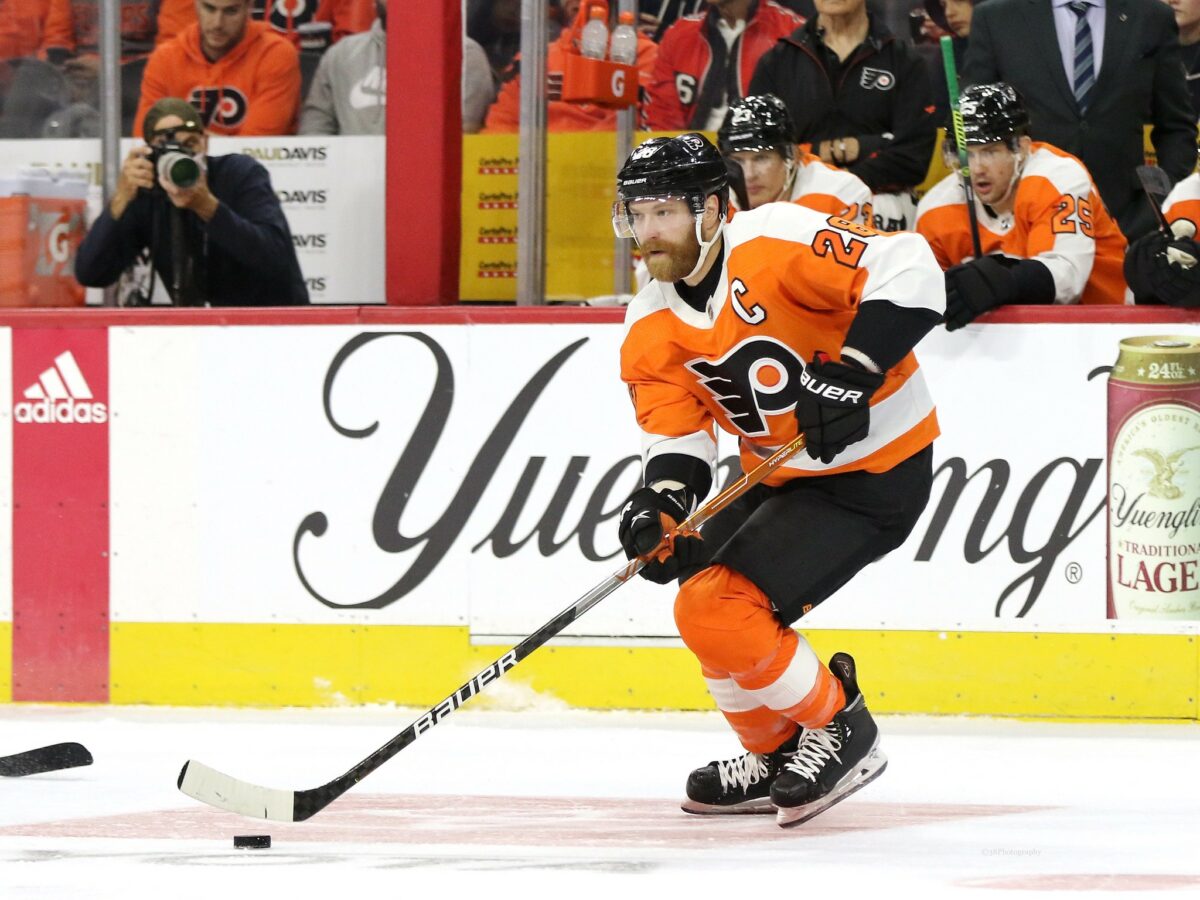
The Flyers’ defense in 2011-12 was old but they still had some great players in Chris Pronger, Kimmo Timonen, Matt Carle, and Braydon Coburn in particular. But by trading star forwards Jeff Carter and Mike Richards and using the extra cap space to sign goaltender Ilya Bryzgalov, they were contradicting themselves. Were they trying to win a Cup as soon as possible or not?
Pronger, one of the backbones of the Flyers’ defense, played his last game on Nov. 19, 2011, due to injury. It would be unfair to call the season a wash after that happened, as the Orange and Black did go to the second round of the playoffs that season, but it hurt their chances of doing anything noteworthy. If they were to have players like Carter and Richards instead of young forwards Jakub Voracek, Brayden Schenn, Wayne Simmonds, and a teenaged Sean Couturier that they got back for their two stars, their chances could have well been better.
The worst part about those Richards and Carter deals was that they were fantastic value. All of the young forwards they got became stars or very close to it, but they reached their prime at the wrong time. The downside of trading Konecny is that Michkov would be alone early on. If he is not surrounded by talent, nothing will change.
Con: Konecny’s Game Could Age Poorly
A player like Konecny, in particular, could see his game could fall off a cliff. He is one of the best scorers off the rush. I compiled every single one of his 23 goals this season, and of those, 14 were scored on the glove side off the rush. That means only nine goals were scored on the blocker side, on the five-hole, in an empty net, or from established possession. He lives and dies by his skating.
Speed doesn’t just vanish for players as they age, but it doesn’t stick around. For a long time, Colorado Avalanche forward Andrew Cogliano was one of the best skaters in the NHL — some would say he was in a league of his own. The 36-year-old is still an above-average skater, but not quite what he once was.
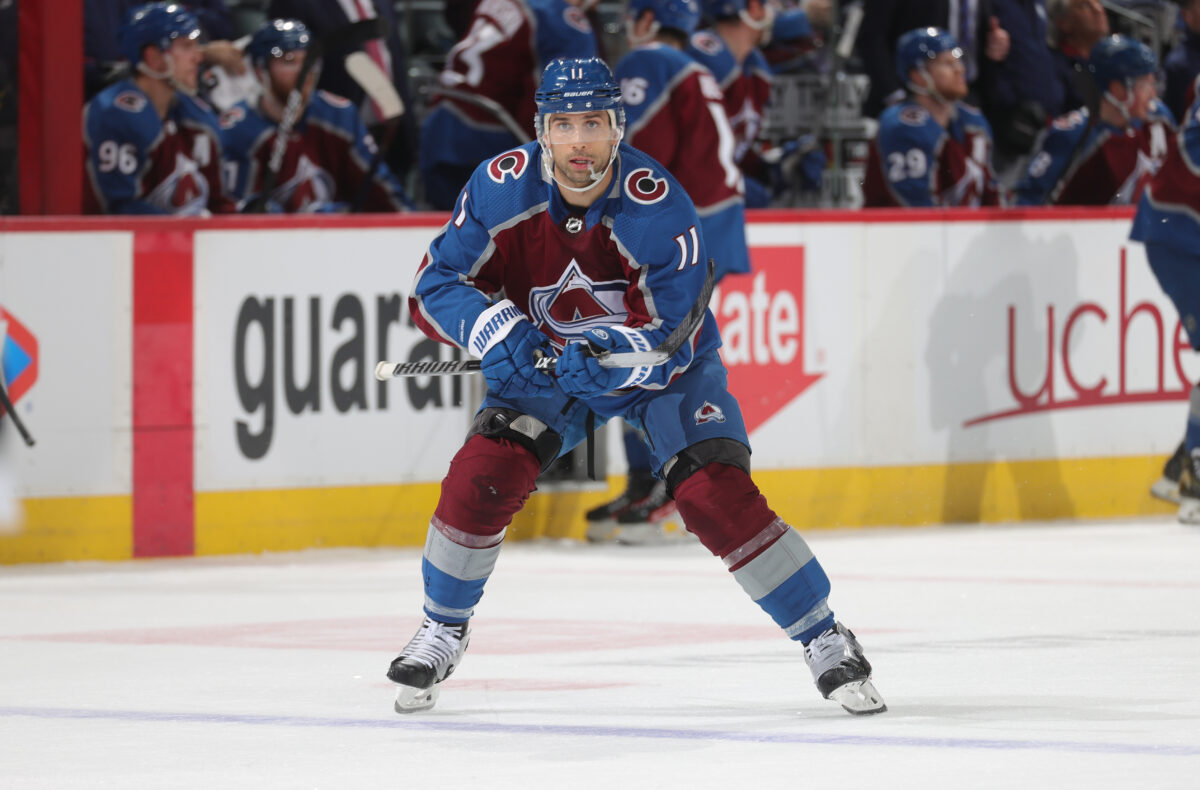
So, if Konecny scores his goals off the rush, regressing in any way skating-wise would hurt his game. He creates opportunities by using his legs more than almost any player, and he could see a huge dip in his scoring by halfway through his (theoretical) eight-year extension.
Pro: Konecny Could Remain a Star
Of course, there’s always an exception. Konecny might just be entering his prime. Filip Forsberg of the Nashville Predators — who signed an eight-year extension worth $8.5 million annually on July 9, 2022 — is a great example. Now in the second season of his deal, he has been exceptional — that would be in 2026-27 for Konecny, and Michkov’s first season in the NHL if all goes according to plan.
With 51 points in 51 games in 2023-24, he is still in the upper echelon of forwards despite his linemates not necessarily being stars. Konecny’s linemates will likely be star-caliber in the future, especially if one of those is Michkov. Instead of being a point-per-game player, he could be greater than that.
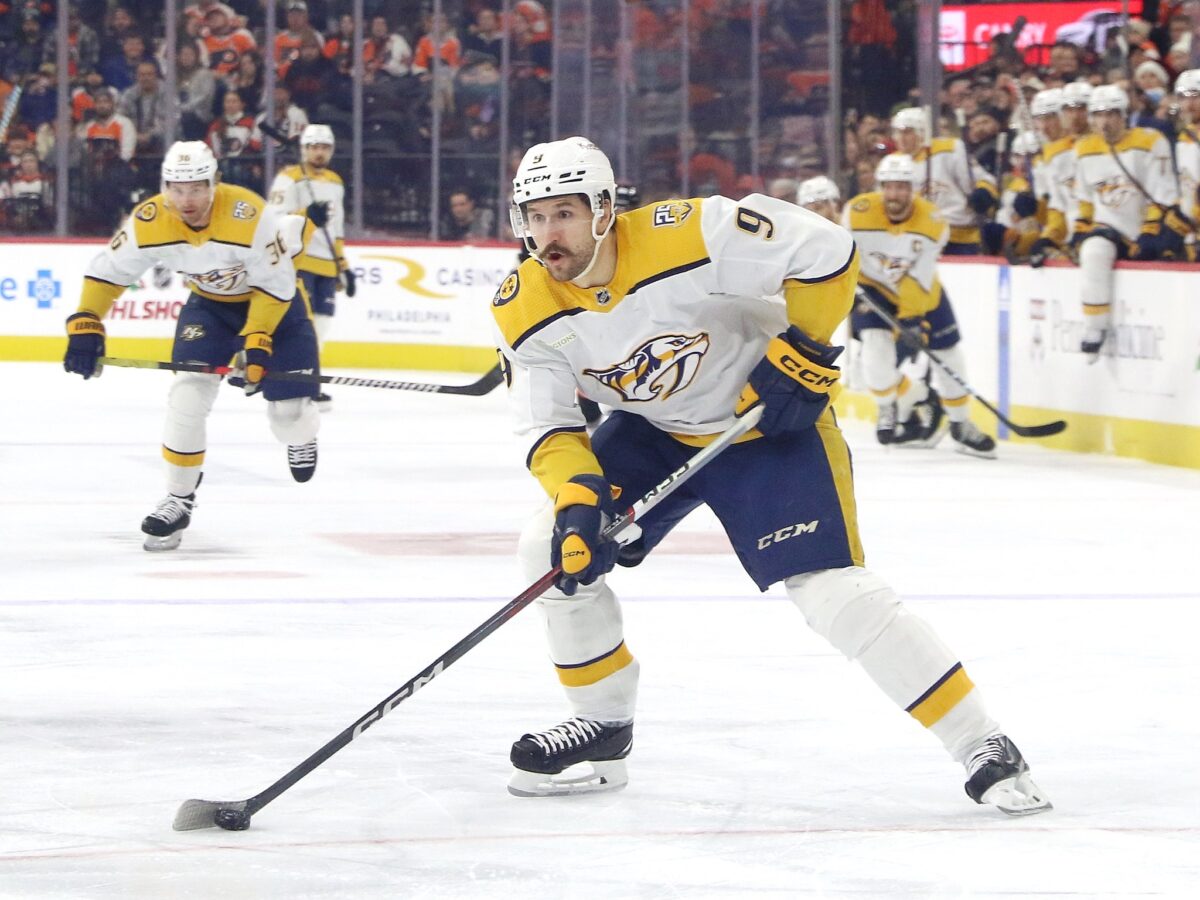
If Konecny continues to be a star, he will be very valuable. As the salary cap continues to rise, he would take up less and less of the team’s space, and if management opts for building their roster from within, his cap number wouldn’t hurt them whatsoever. There’s always a sacrifice in paying the big bucks, but it has rewards, too.
Con: Flyers Should Sign a Free-Agent Star Anyway
Unless the Flyers pull off a few miracles at the draft, they will need good forwards to give themselves a formidable core in the future. Behind Michkov, and excluding Konecny, the Flyers are looking at Joel Farabee, Owen Tippett, Samu Tuomaala, Couturier, and Denver Barkey to make up the long-term top-six. It’s fine, but probably not good enough to win a Stanley Cup.
Couturier could always be traded to free up cap space, but that would leave the Flyers with some decisions to make. They’ll land some forwards to make that core look better in the draft, but right now, it has to improve to become a truly dynamic offense.
It’s more likely that an elite free agent who will be Konecny’s age a few seasons from now would be better suited to improve that than the 26-year-old himself. There are always other fish in the sea, plus he would get the Flyers a package if he were traded, which would help with the rebuild.
John Tavares of the Toronto Maple Leafs was signed to help the core, including Auston Matthews and Mitch Marner, bring a championship to Toronto. Even the superstars need help, and that’s what the Flyers should be in the market for. If they want to win a Stanley Cup, they will have to be aggressive in their pursuit.
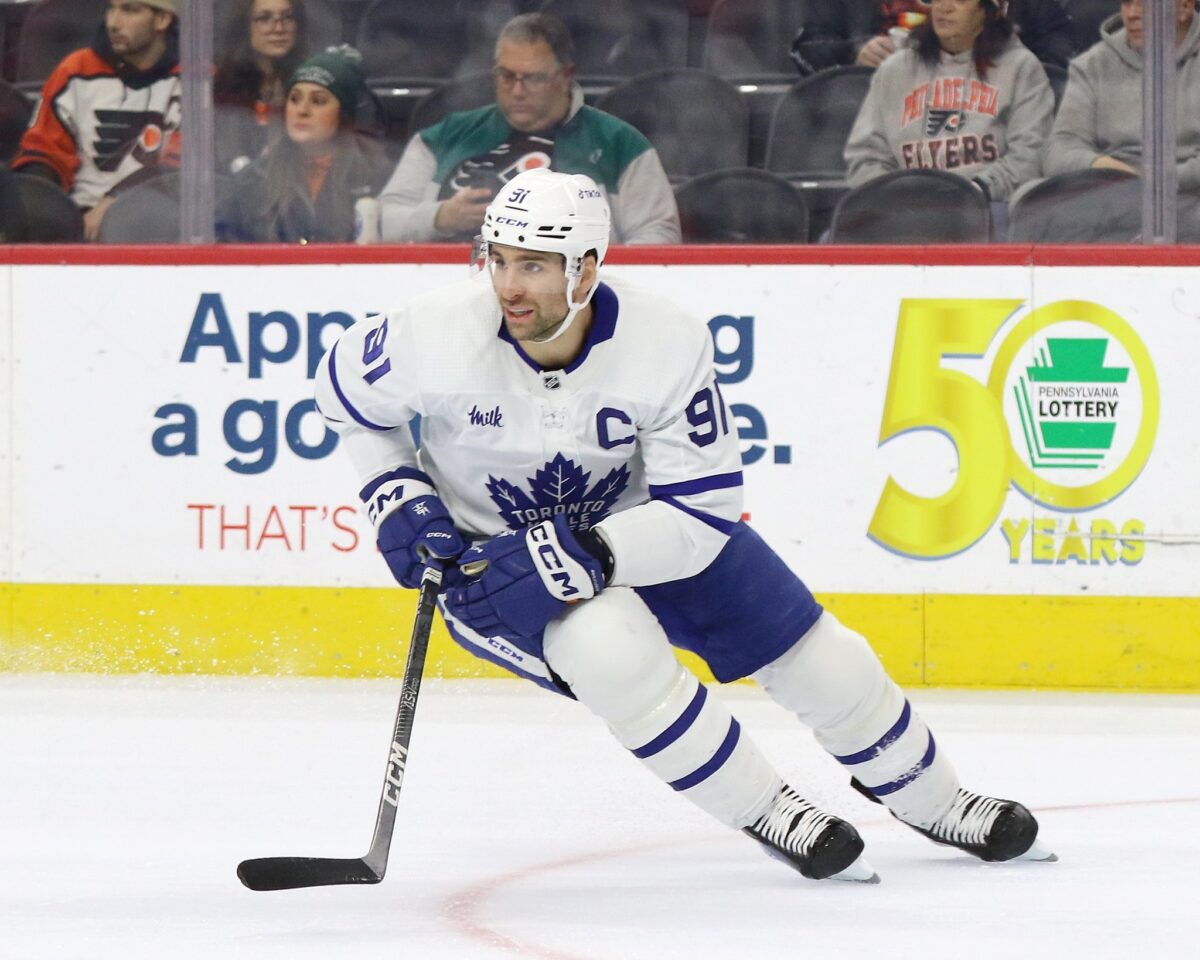
If the Flyers plan to sign a big free agent anyway, wouldn’t it make more sense to get any player for Konecny and then sign them to an extension? There’s a chance that free agent will be the better player by the time Michkov’s best years roll around. Then they’d have that better player and the return from trading Konecny.
Final Verdict: Let the 2024-25 Season Play Out
There are legitimate arguments for either extending or trading Konecny. The final verdict? Don’t rush the process. If Konecny can improve his play for next season, he might be worth it. If nothing changes or if he regresses, that’s probably a good sign to be done with this era. He’s still a phenomenal player, but given what it will likely cost to keep him, the team can never be too careful.
The Flyers have options, and they’ll need to weigh all of them. Briere and company have more than a calendar year to make a decision on Konecny, and they should use every last second.